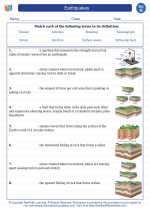Exosphere
The exosphere is the outermost layer of the Earth's atmosphere, extending from about 500 kilometers above the surface of the Earth and merging with the interplanetary space. It is the least dense layer of the atmosphere and consists mainly of hydrogen, helium, and other light gases. The exosphere is where the Earth's atmosphere gradually fades into space.
Characteristics of the Exosphere
- Low Density: The exosphere has an extremely low density, with particles being very far apart from each other.
- Transition to Space: It is the layer where the atmosphere meets outer space and there is no clear boundary between the two.
- Temperature: Temperatures in the exosphere can vary widely, ranging from very hot when exposed to the Sun's radiation, to very cold in shaded areas.
- Escape of Gases: Some of the lighter gases like hydrogen and helium can reach escape velocity and enter into space from the exosphere.
Importance of the Exosphere
The exosphere plays a crucial role in protecting the Earth from the harmful effects of solar radiation. It also facilitates the escape of some gases into space, which can influence the composition of the atmosphere over long periods of time.
Studying the Exosphere
When studying the exosphere, it is important to consider the interactions between the Earth's upper atmosphere and the space environment. Scientists use satellites and instruments mounted on high-altitude balloons to study the exosphere and its dynamics.
Key Concepts to Understand:
- The composition and density of gases in the exosphere
- The role of the exosphere in protecting the Earth from solar radiation
- The mechanisms that lead to gases escaping from the exosphere into space
- The impact of the exosphere on long-term atmospheric changes
Understanding the exosphere is important for gaining insights into Earth's upper atmosphere and its interactions with the space environment.
.◂Science Worksheets and Study Guides Eighth Grade. Earthquakes
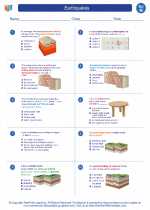
 Worksheet/Answer key
Worksheet/Answer key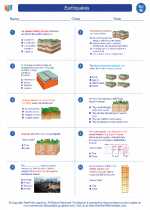
 Worksheet/Answer key
Worksheet/Answer key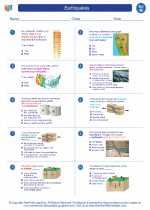
 Vocabulary/Answer key
Vocabulary/Answer key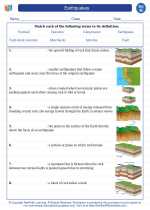
 Vocabulary/Answer key
Vocabulary/Answer key
 Vocabulary/Answer key
Vocabulary/Answer key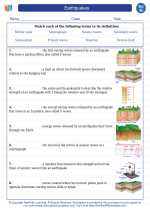
 Vocabulary/Answer key
Vocabulary/Answer key